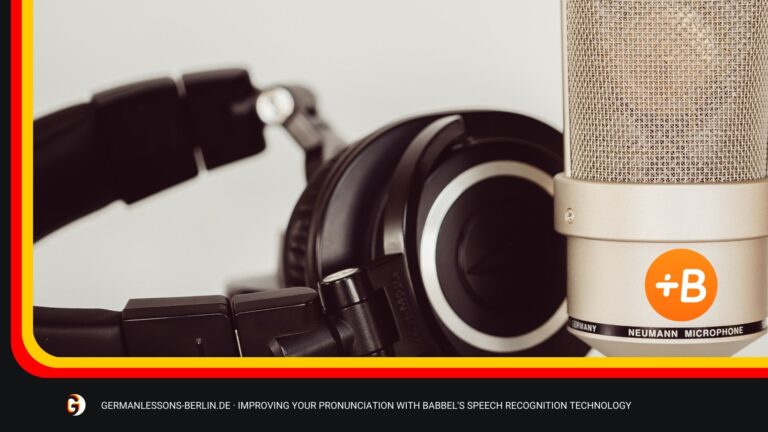Master German pronunciation with this ultimate guide! From vowels and consonants to word stress and intonation, we’ll cover everything you need to know to sound like a native speaker.
If you’re learning German, you know that pronunciation can be one of the biggest challenges. But with a little bit of practice and some expert advice, you can go from struggling to confident in no time.
Table of Contents
Introduction
Are you ready to dive into the ultimate guide to mastering German pronunciation? Look no further! In this article, we’ll explore the importance of German pronunciation and give you an overview of what you can expect to learn. Whether you’re a beginner or an advanced learner, we’ve got you covered.
First things first, why is German pronunciation so important? Well, let’s think about it this way – imagine you’re traveling to Germany and you want to order a beer at a local bar. You confidently order “ein Bier, bitte” but the bartender looks at you with a puzzled expression. You repeat yourself, but still no luck. It turns out, your pronunciation is off and the bartender can’t understand what you’re saying. Frustrating, right?
But fear not, we’re here to help! In this guide, we’ll provide you with everything you need to know to nail your German pronunciation. From vowels and consonants to diphthongs and special sounds, we’ll cover it all.
So, what can you expect to learn in this article? We’ll start with an in-depth look at German vowels. You’ll learn how to correctly pronounce each vowel sound and we’ll provide you with some tips to help you master them. Next up, we’ll dive into German consonants. We’ll explain how to pronounce each consonant sound and provide you with tips to help you improve.
But that’s not all. We’ll also cover German diphthongs and special sounds, such as umlauts, the letter “ß”, and the letter “ch”. We’ll explain how to apply these sounds to correctly pronounce German words.
And that’s just the beginning. We’ll also explore the importance of word stress and intonation in the German language. You’ll learn how to identify and correctly place word stress and intonation in words, and we’ll provide you with an overview of common stress and intonation patterns in German.
Of course, learning German pronunciation takes practice. That’s why we’ll also provide you with suggestions for practicing German pronunciation, including using online resources and working with a tutor. We’ll give you tips for staying motivated and making consistent progress in your pronunciation practice.
And that’s not all! We’ll also cover German pronunciation challenges that English speakers may face, and we’ll provide you with tips and exercises for overcoming these challenges. We’ll even introduce you to the International Phonetic Alphabet (IPA) symbols for German pronunciation and show you how to use them to improve your pronunciation.
And that’s just scratching the surface. We’ll also provide you with tips for getting feedback on your pronunciation from native speakers or teachers, and we’ll suggest useful resources for improving German pronunciation, including apps, websites, and language exchange platforms.
So, are you ready to take your German pronunciation to the next level? Stick with us and we’ll guide you every step of the way. In the following chapters, we’ll explore German pronunciation in-depth and provide you with all the tools you need to master it.
German Vowels
Are you ready to dive into the wonderful world of German vowels? They’re a crucial component of German pronunciation, so let’s get started!
First, let’s talk about what German vowels are. In German, there are 14 different vowel sounds, which can be split into short and long vowels. Short vowels are pronounced for a shorter duration, while long vowels are pronounced for a longer duration. It’s important to correctly differentiate between the two when speaking German.
So, how do you pronounce German vowels correctly? Let’s go through each one:
A: Pronounced like the “a” in “father”
Ä: Pronounced like the “a” in “hat”
E: Pronounced like the “e” in “pet”
I: Pronounced like the “i” in “machine”
O: Pronounced like the “o” in “hot”
Ö: Pronounced like the “e” in “her”
U: Pronounced like the “u” in “put”
Ü: Pronounced like the “ee” in “see”
Y: Pronounced like the “ü” in “über”
Ai: Pronounced like the “i” in “ice”
Au: Pronounced like the “ow” in “how”
Ei: Pronounced like the “i” in “ice”
Eu: Pronounced like the “oy” in “boy”
Ie: Pronounced like the “ee” in “see”
It might seem overwhelming, but with practice, you’ll get the hang of it. Here are some tips for mastering German vowels:
- Listen to native speakers: The best way to learn proper pronunciation is to listen to native German speakers. Pay attention to how they pronounce each vowel and try to replicate it.
- Practice, practice, practice: Practice each vowel sound individually, repeating it until you get it right. It’s important to get comfortable with each vowel before moving on to the next one.
- Focus on long and short vowels: As mentioned earlier, it’s important to correctly differentiate between long and short vowels. Pay attention to the duration of each vowel sound and try to replicate it in your pronunciation.
- Use resources: There are plenty of online resources, such as videos and audio recordings, that can help you practice your German vowel pronunciation.
Remember, mastering German vowel pronunciation takes time and practice. But with these tips and some dedication, you’ll be well on your way to speaking German like a pro.
So, are you ready to take on the challenge of mastering German vowels? Keep practicing, and in no time, you’ll be pronouncing them like a native speaker. In the next chapter, we’ll explore German consonants and provide you with tips for mastering them.
German Consonants
Let’s move on to the next chapter of our ultimate guide to mastering German pronunciation: German consonants. They may seem intimidating at first, but with some practice, you’ll be able to pronounce them like a native speaker.
In German, there are 23 different consonant sounds. These sounds can be divided into several categories based on how they’re pronounced, such as voiceless and voiced consonants, plosive and fricative consonants, and hard and soft consonants.
So, how do you pronounce German consonants correctly? Let’s go through each category:
- Voiceless and Voiced Consonants:
- Voiceless consonants are pronounced without vibrating the vocal cords. Examples include “p”, “t”, and “k”.
- Voiced consonants are pronounced with vibrating vocal cords. Examples include “b”, “d”, and “g”.
- Plosive and Fricative Consonants:
- Plosive consonants are pronounced by completely blocking the airflow and then releasing it suddenly. Examples include “p”, “b”, “t”, and “d”.
- Fricative consonants are pronounced by creating friction as the air passes through a narrow opening in the mouth. Examples include “f”, “v”, “s”, and “z”.
- Hard and Soft Consonants:
- Hard consonants are pronounced with a more forceful and abrupt sound. Examples include “k”, “p”, and “t”.
- Soft consonants are pronounced with a softer and more gentle sound. Examples include “g”, “b”, and “d”.
It might seem like a lot to remember, but with some practice, you’ll be able to differentiate between each sound. Here are some tips for mastering German consonants:
- Listen to native speakers: Just like with vowels, listening to native German speakers is the best way to learn proper pronunciation. Pay attention to how they pronounce each consonant and try to replicate it.
- Focus on individual sounds: Practice each consonant sound individually, repeating it until you get it right. It’s important to get comfortable with each sound before moving on to the next one.
- Pay attention to voiced and voiceless pairs: Some German consonants come in pairs, with one being voiced and the other voiceless. For example, “b” is voiced, while “p” is voiceless. It’s important to pay attention to these pairs and correctly differentiate between the two.
- Use resources: As with vowels, there are plenty of online resources available for practicing German consonant pronunciation.
Remember, practice is key when it comes to mastering German consonant pronunciation. But with these tips and some dedication, you’ll be well on your way to speaking German like a native.
In the next chapter, we’ll dive into German diphthongs and provide you with tips for pronouncing them correctly.
German Diphthongs
Let’s move on to the next chapter of our ultimate guide to mastering German pronunciation: German diphthongs. Diphthongs are two vowel sounds that are pronounced together as a single sound. They may seem complex, but with some practice, you’ll be able to master them.
In German, there are eight different diphthongs. These include:
- au – pronounced like the “ou” in “out”
- äu – pronounced like the “oy” in “boy”
- ei – pronounced like the “i” in “kite”
- eu – pronounced like the “oi” in “boil”
- ie – pronounced like the “ee” in “see”
- öu – pronounced like the “eu” in “feud”
- ui – pronounced like the “ui” in “fruit”
- üu – pronounced like the “ü” in “über” followed by a short “u”
So, how do you pronounce German diphthongs correctly? Let’s go through each one:
- Au: Pronounced like the “ou” in “out”. Make sure to correctly differentiate between the “au” and “äu” sounds.
- Äu: Pronounced like the “oy” in “boy”. This is a unique sound in German, so take your time to practice it.
- Ei: Pronounced like the “i” in “kite”. Be careful not to pronounce it like the English “ay” sound.
- Eu: Pronounced like the “oi” in “boil”. This sound is similar to the “äu” sound, so make sure to differentiate between the two.
- Ie: Pronounced like the “ee” in “see”. This sound is also unique to German, so practice it until you get it right.
- Öu: Pronounced like the “eu” in “feud”. This is another unique sound, so take your time to practice it.
- Ui: Pronounced like the “ui” in “fruit”. This sound is also unique to German, so make sure to practice it.
- Üu: Pronounced like the “ü” in “über” followed by a short “u”. This is another unique sound, so take your time to practice it.
Here are some tips for mastering German diphthongs:
- Listen to native speakers: Once again, listening to native German speakers is the best way to learn proper pronunciation. Pay attention to how they pronounce each diphthong and try to replicate it.
- Practice, practice, practice: Practice each diphthong sound individually, repeating it until you get it right. It’s important to get comfortable with each sound before moving on to the next one.
- Use resources: As with vowels and consonants, there are plenty of online resources available for practicing German diphthong pronunciation.
Remember, mastering German diphthong pronunciation takes time and practice. But with these tips and some dedication, you’ll be well on your way to speaking German like a pro.
In the next chapter, we’ll explore special German sounds, such as umlauts, the letter “ß”, and the letter “ch”, and provide you with tips for correctly pronouncing them.
German Special Sounds
We’ve covered German vowels, consonants, and diphthongs, but there are still some special sounds in German that you’ll need to master to speak the language like a native.
Special sounds in German include umlauts, the letter “ß”, and the letter “ch”. Umlauts are two dots above a vowel that indicate a different sound, while the letter “ß” represents a sharp “s” sound. The letter “ch” can be pronounced in several different ways depending on the word.
So, how do you apply these special sounds to German words? Let’s go through each one:
- Umlauts: The three umlauts in German are ä, ö, and ü. To pronounce an umlaut, place your tongue in the position for the vowel sound and round your lips. Then, add the umlaut sound on top of it. For example, to pronounce the word “müde” (tired), pronounce the “ü” sound as you would normally, but with rounded lips.
- The Letter “ß”: The letter “ß” is a sharp “s” sound, which is pronounced similar to the “s” sound in “hiss”. Use it in place of “ss” in certain words, such as “Straße” (street) or “Maß” (measure).
- The Letter “Ch”: The letter “ch” can be pronounced in several different ways. In general, it’s pronounced with a “k” sound in the beginning of a word, a “h” sound in the middle of a word, and a hissing sound at the end of a word. For example, “ich” (I) is pronounced with a hissing sound at the end, while “nach” (after) is pronounced with a “h” sound in the middle.
Here are some tips for mastering German special sounds:
- Practice, practice, practice: Just like with vowels, consonants, and diphthongs, practice is key when it comes to mastering German special sounds. Take your time to practice each sound until you get it right.
- Listen to native speakers: Listening to native German speakers is once again the best way to learn proper pronunciation. Pay attention to how they pronounce each special sound and try to replicate it.
- Use resources: There are plenty of online resources available for practicing German special sounds, so make use of them.
Remember, mastering German special sounds takes time and practice. But with these tips and some dedication, you’ll be well on your way to speaking German like a pro.
In the next and final chapter, we’ll provide you with some additional tips and resources for practicing your German pronunciation.
German Word Stress and Intonation
We’re almost there! In this final chapter of our ultimate guide to mastering German pronunciation, we’ll explore word stress and intonation in German.
Word stress is the emphasis placed on a particular syllable in a word. Intonation refers to the rise and fall of your voice as you speak, which can convey meaning and emotion.
In German, word stress is placed on the first syllable of the word in most cases. However, there are some exceptions to this rule, which we’ll cover shortly.
Here are some tips for placing word stress and intonation in German:
- Listen to native speakers: As with all aspects of German pronunciation, listening to native speakers is key. Pay attention to how they stress words and use intonation to convey meaning.
- Use a German-English dictionary: Many German-English dictionaries provide stress marks for each word. This can be a helpful tool for practicing word stress.
- Practice reading out loud: Practice reading German texts out loud and pay attention to where the stress falls in each word. Try to use the correct intonation to convey meaning.
Now, let’s take a closer look at some common stress and intonation patterns in German:
- First syllable stress: As we mentioned earlier, most German words are stressed on the first syllable. This is the most common stress pattern in the language.
- Compound words: In compound words, the stress is placed on the first syllable of the first word. For example, “Hausaufgaben” (homework) is stressed on the “Haus” syllable.
- Prefixes: When a word has a prefix, the stress is placed on the syllable after the prefix. For example, “verstehen” (to understand) is stressed on the “stehen” syllable.
- Vowel length: In German, long vowels are often stressed. For example, in the word “Läufer” (runner), the stress is on the “Läu” syllable.
- Emphasis: Intonation can be used to emphasize certain words or phrases in a sentence. For example, if you want to emphasize that you’re from Berlin, you might say “Ich komme aus Berlin” (I’m from Berlin) with emphasis on “Berlin”.
Remember, word stress and intonation are important aspects of German pronunciation. With some practice, you’ll be able to use them to convey meaning and emotion in your speech.
In conclusion, we’ve covered everything from German vowels and consonants to diphthongs, special sounds, and word stress and intonation. By following the tips and techniques outlined in this guide, you’ll be well on your way to mastering German pronunciation. Don’t forget to practice regularly and listen to native speakers to truly hone your skills. Good luck!
German Pronunciation Practice
Now that we’ve covered the basics of German pronunciation, it’s time to put your skills into practice. In this chapter, we’ll provide you with some suggestions for practicing German pronunciation and tips for staying motivated in your practice.
First, let’s go over some suggestions for practicing German pronunciation:
- Use language learning apps: There are many language learning apps available that can help you practice your German pronunciation. Some popular options include Duolingo, Babbel, and Rosetta Stone.
- Listen to German music: Listening to German music can be a fun way to practice your pronunciation. Pay attention to how the words are pronounced and try to sing along.
- Watch German TV shows and movies: Watching German TV shows and movies can help you get a feel for the rhythm and intonation of the language. Pay attention to how the actors pronounce words and try to mimic them.
- Practice with a language partner: Finding a language partner to practice with can be a great way to get feedback on your pronunciation. You can also practice your listening skills by listening to your partner speak.
- Read aloud: Practice reading German texts out loud and pay attention to your pronunciation. You can also record yourself and listen back to check your progress.
Next, let’s talk about staying motivated in your pronunciation practice:
- Set realistic goals: Setting goals for your pronunciation practice can help you stay motivated. Make sure the goals are realistic and achievable.
- Celebrate small victories: Celebrating small victories can help you stay motivated. For example, if you finally master the pronunciation of a difficult word, give yourself a pat on the back.
- Make it fun: Pronunciation practice doesn’t have to be boring. Make it fun by incorporating games and challenges into your practice.
- Find a community: Finding a community of other German learners can help you stay motivated and get feedback on your pronunciation. Look for language exchange groups or online forums where you can connect with others.
- Don’t give up: Learning a new language takes time and practice. Don’t get discouraged if you don’t see progress right away. Keep practicing and you will get there.
In conclusion, practicing your German pronunciation is an important part of learning the language. By using the suggestions and tips outlined in this guide, you can improve your pronunciation skills and stay motivated in your practice. Remember to be patient with yourself and enjoy the process. Good luck!
German Pronunciation Exercises
In this chapter, we’ll provide you with a variety of exercises for improving your German pronunciation. These exercises will help you to focus on specific sounds, practice word stress and intonation, and prepare you for different situations where you may need to use German.
- Drills for specific sounds: To improve your pronunciation of specific sounds, it can be helpful to practice drills. For example, if you’re struggling with the “ch” sound, you can practice saying words like “ich” and “nicht” over and over again.
- Word lists for practicing stress and intonation: You can also practice word stress and intonation by using word lists. Look for lists of words with different stress patterns and practice saying them out loud.
- Exercises for different situations: To prepare for different situations where you may need to use German, you can practice exercises that simulate those situations. For example, you can practice ordering food at a restaurant or asking for directions in German.
Here are some more specific exercises for improving your German pronunciation:
- Shadowing: Shadowing involves listening to a native speaker and repeating what they say at the same time. This can help you to improve your intonation and rhythm.
- Minimal pairs: Minimal pairs are pairs of words that differ by only one sound. For example, “schön” (beautiful) and “schon” (already) are a minimal pair. Practicing these pairs can help you to distinguish between similar sounds.
- Tongue twisters: Tongue twisters are phrases that are difficult to say quickly and accurately. Practicing tongue twisters can help you to improve your diction and accuracy.
- Singing: Singing in German can be a fun way to practice your pronunciation. Pay attention to the lyrics and try to sing along with the correct pronunciation.
Remember, the key to improving your German pronunciation is practice. Try to incorporate these exercises into your daily routine and practice regularly. With time and patience, you’ll be able to speak German with confidence and clarity.
In conclusion, we’ve covered a variety of exercises that can help you improve your German pronunciation. From drills for specific sounds to exercises for different situations, there are many ways to practice and hone your skills. Remember to be patient with yourself and have fun with the process. Good luck!
German Pronunciation Tips for English Speakers
In this chapter, we’ll focus specifically on the challenges that English speakers face in learning German pronunciation and provide tips and exercises to help overcome these challenges.
One of the biggest challenges that English speakers face in learning German pronunciation is the difference in vowel sounds. German has several vowel sounds that are not found in English, and this can make it difficult to produce them accurately.
To overcome this challenge, it can be helpful to practice listening to and repeating these sounds. You can also try using a mirror to observe the movements of your mouth and tongue as you produce the sounds.
Another challenge that English speakers face is the “ch” sound, which is different in German than in English. In German, the “ch” sound is produced in the back of the throat, while in English it is produced in the front of the mouth.
To overcome this challenge, it can be helpful to practice saying words that contain the “ch” sound, such as “ich” and “nicht,” over and over again. You can also try producing the sound while holding your throat to feel the vibration.
Here are some more tips and exercises for overcoming pronunciation challenges as an English speaker:
- Pay attention to word stress: In German, word stress is often placed on the first syllable of a word. Paying attention to word stress can help you to produce the correct intonation and rhythm.
- Mimic native speakers: Listening to and mimicking native speakers can help you to improve your pronunciation. Look for resources such as German-language podcasts or videos where you can hear authentic German spoken.
- Practice tongue placement: In German, certain sounds are produced by placing the tongue in different positions in the mouth. Practicing tongue placement can help you to produce these sounds more accurately.
- Use pronunciation guides: There are many online resources available that provide pronunciation guides for German. These guides can help you to understand the correct pronunciation of words and sounds.
Remember, improving your German pronunciation takes time and practice. Don’t get discouraged if you don’t see progress right away. Keep practicing and you will improve.
In conclusion, English speakers face specific challenges in learning German pronunciation, but with the right tips and exercises, these challenges can be overcome. Remember to practice regularly, pay attention to word stress, and mimic native speakers. With time and patience, you’ll be able to speak German with confidence and clarity.
Using IPA Symbols for German Pronunciation
In this chapter, we’ll introduce you to the International Phonetic Alphabet (IPA) symbols for German pronunciation and explain how you can use them to improve your pronunciation.
The IPA is a set of symbols used to represent the sounds of all languages. By using the IPA symbols for German, you can better understand the pronunciation of German words and improve your own pronunciation.
Here are some basic IPA symbols that you should know for German pronunciation:
/a/ – as in “Mann” (man)
/e/ – as in “sehen” (to see)
/i/ – as in “Liebe” (love)
/o/ – as in “kommen” (to come)
/u/ – as in “Buch” (book)
/y/ – as in “Müller” (miller)
/ɛ/ – as in “gehen” (to go)
/œ/ – as in “öffnen” (to open)
/ʊ/ – as in “Kuss” (kiss)
/ɪ/ – as in “Mittel” (middle)
/ʁ/ – as in “rot” (red)
/ç/ – as in “ich” (I)
To use IPA symbols to improve your pronunciation, you can look up the pronunciation of German words in a dictionary or online resource that provides IPA symbols. This will help you to better understand how to produce the sounds and intonation of each word.
You can also use IPA symbols to compare the pronunciation of similar words or to distinguish between different sounds that may be difficult to produce for English speakers.
Here are some tips for using IPA symbols to improve your pronunciation:
- Practice each sound individually: To improve your pronunciation of a particular sound, practice saying words that contain that sound over and over again.
- Use minimal pairs: Minimal pairs are pairs of words that differ by only one sound. Practicing minimal pairs can help you to distinguish between similar sounds and improve your accuracy.
- Record yourself: Record yourself speaking German and compare your pronunciation to that of a native speaker or a pronunciation guide.
- Listen to authentic German: Listening to authentic German spoken by native speakers can help you to better understand the sounds and intonation of the language.
In conclusion, the IPA symbols for German pronunciation can be a useful tool for improving your pronunciation. By practicing each sound individually, using minimal pairs, recording yourself, and listening to authentic German, you can improve your accuracy and clarity when speaking German. Incorporate these tips into your daily practice and you’ll be well on your way to mastering German pronunciation.
How to Get Feedback on Your German Pronunciation
In this chapter, we’ll provide you with tips on how to get feedback on your German pronunciation and suggest some online resources and language exchange platforms that you can use to practice your skills and get feedback from others.
Getting feedback on your German pronunciation is crucial for improving your skills and making sure you’re on the right track. Here are some tips for getting feedback on your pronunciation:
- Find a language partner: One of the best ways to get feedback on your German pronunciation is to find a language partner who is a native speaker of German. You can practice speaking with them and they can provide you with feedback on your pronunciation.
- Use online resources: There are many online resources that offer pronunciation exercises and feedback. Some of these resources include websites, apps, and software that provide feedback on your pronunciation.
- Take a language course: Joining a language course or hiring a tutor can be a great way to get feedback on your German pronunciation. A professional instructor can offer tailored feedback and provide you with personalized exercises to improve your skills.
- Join a language exchange group: Language exchange groups are a great way to meet other language learners and native speakers of German. You can practice your German skills with them and get feedback on your pronunciation.
Here are some online resources and language exchange platforms that you can use to get feedback on your German pronunciation:
- iTalki: iTalki is an online platform that connects language learners with professional teachers and language exchange partners. You can take online classes or find a language exchange partner to practice speaking with.
- HelloTalk: HelloTalk is a language exchange app that connects language learners from all over the world. You can find a language partner to practice speaking with and get feedback on your pronunciation.
- Lingoda: Lingoda is an online language school that offers group and private classes. You can take classes with a professional instructor and get personalized feedback on your pronunciation.
- Forvo: Forvo is a website that provides audio pronunciation of words in different languages. You can search for German words and listen to how they’re pronounced by native speakers.
In conclusion, getting feedback on your German pronunciation is an important part of improving your skills. By finding a language partner, using online resources, taking a language course, or joining a language exchange group, you can practice your skills and get feedback on your pronunciation. Use these tips and resources to take your German pronunciation to the next level.
German Pronunciation in the Context of Grammar
In this chapter, we’ll explore the relationship between German pronunciation and grammar/syntax, and provide you with tips on how to use pronunciation to improve your language skills.
German pronunciation and grammar/syntax are closely related. The way a word is pronounced can change its meaning, and the way words are stressed and intonated can affect the overall meaning of a sentence.
Here are some tips for using German pronunciation to improve your language skills:
- Pay attention to word stress: German words are stressed on the first syllable, and this can affect the meaning of the word. For example, the word “Kunde” (customer) is pronounced with the stress on the first syllable, while “künden” (to announce) is pronounced with the stress on the second syllable. Paying attention to word stress can help you understand the meaning of a word and use it correctly in a sentence.
- Use correct intonation: In German, intonation can change the meaning of a sentence. For example, a statement can become a question if it’s said with rising intonation. Paying attention to intonation can help you understand the meaning of a sentence and use the correct intonation to convey your own meaning.
- Pronounce words correctly: Pronouncing words correctly is crucial for understanding and being understood in German. Pay attention to the different vowel and consonant sounds and practice pronouncing them correctly.
- Use IPA symbols: IPA symbols can be helpful for understanding and practicing German pronunciation. They provide a standardized way of representing sounds and can help you identify and produce specific sounds more accurately.
Using these tips, you can use German pronunciation to improve your language skills. By paying attention to word stress and intonation, practicing pronunciation, and using IPA symbols, you can improve your understanding of German grammar and syntax and become more confident in your language skills.
In conclusion, German pronunciation and grammar/syntax are closely related, and by using pronunciation to improve your language skills, you can become more confident and effective in your communication. Pay attention to word stress and intonation, practice pronunciation, and use IPA symbols to take your German skills to the next level.
German Pronunciation Resources
If you’re serious about mastering German pronunciation, you’ll need all the help you can get. Thankfully, there are numerous resources available to help you improve your skills. In this chapter, we’ll provide an overview of the most useful resources and tools for German pronunciation practice.
Overview of Useful Resources for Improving German Pronunciation
There are many different types of resources that you can use to improve your German pronunciation. Here are some of the most popular and effective:
- Language Learning Apps: Language learning apps such as Duolingo, Babbel, and Memrise provide interactive courses in German pronunciation that offer immediate feedback and personalized learning paths.
- YouTube Videos: YouTube has a wealth of German pronunciation videos with native speakers demonstrating different sounds and techniques. Channels like Easy German and Learn German with Anja are great for learning new techniques and tips.
- Online Courses: Online courses like the one offered by Goethe Institute or Udemy provide more structured and comprehensive German pronunciation training, including lessons on grammar, vocabulary, and cultural context.
- Language Exchange Platforms: Language exchange platforms like Tandem and HelloTalk connect you with German speakers for real-time conversations and pronunciation practice.
Apps, Websites, and Language Exchange Platforms for Pronunciation Practice
Here are some of the best apps, websites, and language exchange platforms for German pronunciation practice:
- Speechling: Speechling is a language learning platform that uses native speakers to provide feedback and personalized practice for German pronunciation.
- Forvo: Forvo is an online database of German words and phrases pronounced by native speakers. It’s a great resource for hearing how words are pronounced in context.
- German Pronunciation Trainer: German Pronunciation Trainer is an app that uses voice recognition technology to help you perfect your pronunciation skills. It offers interactive exercises to help you master specific sounds and intonation patterns.
- Tandem: Tandem is a language exchange app that connects you with native German speakers for pronunciation practice and real-time conversation.
- Deutsche Welle: Deutsche Welle is a German news site that offers a range of multimedia resources for German learners, including videos and audio recordings for pronunciation practice.
Overall, the key to improving your German pronunciation is consistent practice and exposure to the language. By using the resources and tools available, you can make significant progress towards mastering German pronunciation and achieving fluency.
Conclusion
Congratulations! You have made it to the end of “The Ultimate Guide to Master German Pronunciation.” In this guide, we have covered everything you need to know to improve your German pronunciation, from an introduction to German sounds to tips and exercises for perfecting your pronunciation.
We hope that this guide has been helpful in your language learning journey and has given you the confidence to speak German more fluently. As a language learner, it is important to understand the significance of pronunciation and how it can impact your communication skills.
In this final chapter, we will recap the importance of German pronunciation and offer some final words of encouragement to help you stay motivated in your language learning.
Recap of Importance of German Pronunciation
We cannot stress enough the importance of German pronunciation in language learning. Having a good grasp of German pronunciation will not only improve your speaking skills but also your listening skills. Accurate pronunciation will help you understand native speakers and make it easier for them to understand you as well.
Proper pronunciation is also essential if you plan on using German for professional or academic purposes. It can even help you make a better impression during your travels to German-speaking countries.
Final Words of Encouragement for Language Learners
Learning a new language can be challenging, but it is also an incredibly rewarding experience. We hope that this guide has inspired you to continue on your language learning journey and to never give up on your goals.
Remember, practice is the key to success in language learning. Consistency and persistence are essential to achieving your language goals. Keep practicing, and you will see improvement over time.
Also, don’t be afraid to make mistakes. Mistakes are a natural part of the language learning process, and they can be a great learning opportunity. Embrace them and learn from them, and you will become a better German speaker.
Finally, always stay motivated and have fun with your language learning. Language learning should be an enjoyable experience, and the more fun you have with it, the more motivated you will be to continue learning.
Thank you for reading “The Ultimate Guide to Master German Pronunciation.” We wish you the best of luck on your language learning journey!








